learn by going
Reading with a felonious mind, cross-genre. Also, I read contemporary poetry, and so should you.
Version Control, by Dexter Palmer
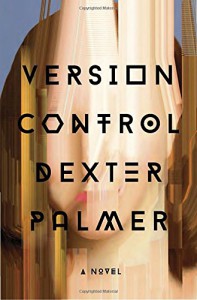
I'm seeing a theme in this year's Tournament of Books shortlist (or, I should say, those books whose samples appealed to me): genre-bending and concerns about identity. I like to think about the lines between or blurring genres, and I appreciate the lens of race or sexuality, both of which are commonly excluded from much genre fic.
Dexter Palmer's Version Control is speculative, but only just: its future is near, and there are certainly elements that are not at all far-fetched and therefore frightening: self-driving cars that can endanger passengers when, say, a firmware update has a glitch; data mining and what it could be used for; digital avatars, operating much like bot accounts on social media sites. There are also reminders for our own present, such as the real goals of online dating services--to keep you using (and paying) as long as possible, not successfully find a partner.
Palmer's novel is marketed as "time travel like you've never seen it before." I'll go ahead and preface my questions about and problems with the book by saying I'm easily confused by time travel narratives, no matter how well explained.
The book is structurally tight, with thematic echoes across points of view and timelines, of which there are two. The idea of "the best of all possible worlds" is central; when it's inevitably discovered that the device the protagonist's husband is working on is, well, working, despite a lack of scientific proof, the characters realize what we as readers learned about halfway through the book when details of their lives change (character x is dead instead of y; characters go--or don't go--by certain nicknames; character a cheats with character b rather than c, etc.): every time someone enters the "causation violation" chamber, a new timeline branches off.
Before the characters themselves are in the know, in the first timeline explored, the protagonist feels something's not right, but can't explain what. She's not alone; the phenomenon is experienced by others and has become a diagnosis. What I don't understand is why they have that sense of wrongness. I was also confused by Sean, the physicist and protagonist's son. Is his mural as his mother, Rebecca, sees it, or as Alicia sees (or doesn't see) it? Is he simply an artistic child suffering from loss?
Though thematically sound with some fresh explorations of gender and race in the hard sciences especially, Version Control didn't quite come together for me. I didn't particularly like or care about any of the characters; I'd say Carson was most interesting to me. The end was fairly predictable; I enjoyed the first half more. I have some stylistic quibbles that are just my bias, like chunks or pages of dialog, which reminded me of exposition in movies, and what felt like unnecessary section breaks. But I wanted to know what happened next, and the mystery of what was going on and why definitely kept me reading.
Black Wave, Michelle Tea

The more I read (and watch movies and TV), the more I value encountering something unlike anything else I ever have before. Black Wave, by Michelle Tea, immersed me in a world new to me in several ways.
Though there are occasionally individual queer characters in the books I read, I haven't read much queer lit where a larger community is represented, especially queer women. Black Wave is set in San Francisco in the 90s at the start, an alternative past where gentrification has strangled most of the culture(s) from the city. In addition, the world appears to be ending due to advanced climate change: it's dangerous to be out in the sun even incidentally, the ocean is a trash wave, many animals are extinct, and invasive species have overtaken the dying native flora. In other words, the environment's death mirrors a cultural and, as is soon apparent, a personal one.
The protagonist, Michelle (like the author), is in her later twenties, and is the kind of addict who tells herself she's not because she doesn't shoot heroin but snorts it and is able to keep her job at a bookstore. She falls in love (or becomes infatuated) easily and hooks up with many of the women who come into her orbit, despite being in a "steady" relationship with a partner more stable than she is. At one point the point of view shifts from Michelle's to her girlfriend's, who thinks she's a sociopath.
That feels pretty accurate, but one of the amazing things about Black Wave is that despite Michelle's objectively unlikable character, I still felt very much invested in her. In part this is due to the humor and energy of the writing. For example:
Michelle seemed more like some sort of compulsively rutting land mammal, a chimera of dog in heat and black widow, a sex fiend that kills its mate. Or else she was merely a sociopath. She was like the android from Blade Runner who didn’t know it was bad to torture a tortoise. She had flipped [her girlfriend] Andy onto her belly in the Armageddon sun and left her there, fins flapping.
I may also personally respond to Michelle because she's a writer, one who's even published and had a sort of local fame. Around the midpoint of the book when she moves to L.A., the narrative is deconstructed as she attempts to write a new book. It becomes clear that not everything we've read so far is as it happened. Another aspect I liked is that somehow this sudden shift doesn't feel like a trick as can happen in many modernist and post-modernist writing and metafiction. How and why I don't know, but after some minor readjustment on my part as a reader, I was still invested.
I've often noted what a structure fanatic I am, and the last major selling point of Black Wave is the way it beautifully spins out in the last third.
Tangents were Michelle’s favorite part of writing, each one a declaration of agency: I know I was going over there but now I’m going over here, don’t be so uptight about it, just come along. A tangent was a fuckup, a teenage runaway. It was a road trip with a full tank of gas. You can’t get lost if you don’t have anywhere to be. This was writing for Michelle: rule free, glorious, sprawling.
As the world ends, people begin dreaming vividly and lucidly about others who exist in the real world, all over the world. They're dreams of connection and love where identity is fluid, and some begin living in them, like Michelle's bosses at the bookstore who hand over the business to her. So the world ends, but somehow Michelle's in a good place, and so was I.
Tournament of Books Play-In
Featuring three novels all to do with sports that I haven't read, one of which I plan to read and won this pre-tournament round.
Michelle Tea, Black Wave
Sweet Lamb of Heaven, by Lydia Millet
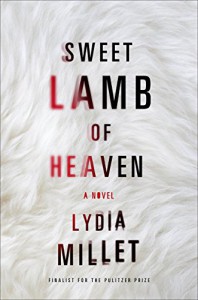
Hm. Hmmm. This is a difficult book to write about as it defies easy genre placement. It has notes of thriller, horror, SF/speculative fiction, and philosophy. I chose to shelve it under "literary fiction" because I don't see a conflict between the literary and genre elements.
Judging by the three-star average rating, most will either love or be confounded by and hate this novel. It took some warming up for me, and I have other quibbles about characterization and writing style. But when I finished the book, I wanted to jump back in and discuss it.
It's a novel of big (and politically relevant) ideas wrapped in a domestic thriller. The story centers on a mom and her young daughter. The mother, Anna, hears a voice. Not voices, one voice, and much of the novel's first quarter or third is spent characterizing this voice--what it is and isn't, if not why it is at all. Then, the voice stops. Anna is relieved but still puzzled. More importantly, she has to get away from her husband, who is revealing himself to be a sociopath. She sets out on her own with her daughter and shacks up at a motel in New England. Her husband doesn't care until he decides to run for a government office. He wants his estranged wife and kid around as political props. Anna resists but is threatened.
Interspersed with events are bits of research Anna has done on the voice--on language and communication across species, flora and fauna, on God and mental health, community and self-hood. She's found a small community at the isolated motel, and they contribute to her understanding. The closer she comes to making sense of things, the more danger she's in until matters reach a breaking point, not felt until she realizes just how much she's been manipulated.
Millet is posing some big questions and making assertions that ring especially true in our new extreme-right and digital environments. I haven't yet sorted through all the implications of the story, but I'm happy for the challenge.
The Bartleby Strategy
How a Melville character can serve as a model for bureaucrats/civil servants to resist in the age of Trump. From Boston Review.
American Housewife, by Helen Ellis
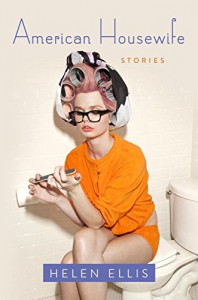
My first thoroughly enjoyable read of the year. Despite never having been a housewife (or wife, period) myself, I felt like this short story collection's ideal audience. There are plenty of films and books that cover similar ground--the details, drudgery, absurdity, and even darkness of being a housewife--but Ellis manages to make the content fresh through voice and form.
All the stories made me laugh out loud or grin sardonically, from the first, brief portrait of a modern housewife, to the email exchange between two passive aggressive--and then just aggressive--ladies occupying the same building (my favorite), to the Dumpster Diving with the Stars reality show. Some stories, like the first, are flash fiction and read like prose poems to me. Others are fuller, like the ending story about contemporary novel writing in the age of sponsorship and social media. In that story and others, the horror of aspects of our culture becomes real.
Satisfying and sharp-tongued (without looking down on its characters), this collection completely won me over from the start.
Tournament of Books Shortlist
Cripes, the Tournament of Books shortlist was announced earlier in January, and somehow I missed it!
I've read 2 out of 18, including my favorite book from 2016, We Love You, Charlie Freeman, by Kaitlyn Greenidge.Then 3 are on my wishlist, with 3 more that were maybes. The remaining 10 I either had no interest in or didn't enjoy the samples I read. Hoping to join the conversation come March.
ETA: Looking at the list of judges, I'm happy to see lots of ladies!
The North Water, by Ian McGuire

I'm dropping this at 35%. After the polar bears and second rape of a child, I'm done. The sample dazzled me when I read it: rich language, dark, and a favorite subject (whaling, remote places). I'd thought I was in the mood for it, having recently gone on a bit of a vengeance binge. But the language became too much; I don't need to constantly know how nasty everything smells. As I read I realized this would be one of those books that is about how ugly people are. Current events are reminding me of that enough.
Rush Oh! by Shirley Barrett

This is the second novel in a row I've read (after Enchanted Islands) that's written as a sort of memoir from the perspective of an older person looking back. I'm not overly fond of traditional memoirs and wonder if this may in part account for my less than enthusiastic reaction upon finishing.
What this book does have going for it is a charming, somewhat unreliable narrator. Her asides and style as a storyteller often delighted and amused me. Mary is a naive girl at the start, and as an adult seems not much wiser. As a reader you may arch your brow at the gaps in her knowledge or what lies beneath her personality quirks (e.g. as a woman in her 50s at the end, she has developed a kind of fetish for reverends, owing to her first love, explored throughout the book). Mary is so plucky (and often critical of others) that I assumed she was still a child when the story began (in fact, she's a young lady already).
Returning to what I'm describing as memoir-ish--and an author's note explains that Mary's father was a real person, if not the whole family--there's only so much narrative thrust to the story. The plot advances in short chapters interspersed with others that give some background to the characters and to whaling. Essentially, Mary relays an account of a particular whaling season in Australia, most significant for her because she meets her first (and only romantic) love.
The novel was pleasant enough to read, but I needed something more and was also left confused by the end. Why end on that moment?
Enchanted Islands, by Allison Amend

From the Tournament of Books longlist.
What a hot mess. Judging from reviews on Amazon, I'm in the minority with that opinion, but I found it difficult to follow protagonist Frances Conway's arc through the story. There's a huge gap between her 16 and 50-something year-old selves, decades briefly highlighted, and the two did not connect for me. Frances/Fanny goes from naive teenager to something of a resigned spinster in few pages. I never quite caught up from that whiplash.
The novel spans Frances's whole life, from child of Jewish immigrants in Minnesota, to Chicago with her best frenemy, Rosalie, to a farm in Nebraska, then onto California where she works at the Office of Naval Intelligence peri-WWII and is eventually asked to marry officer Ainslie Conway and move with him to the Galapagos Islands, where there are an awful lot of Germans (an awful lot for such a small, wild place), to engage in spycraft. The book's title indicates that this period will be the story's focus, but it comes in much later than expected. The first third or so of the novel therefore feels like it's treading water as we follow Frances and Rosalie's friendship, their "break-up," and reunion years later in San Francisco. I wish the book had been either larger, to more fully explore Frances's journey, or shorter, narrowing in on the time on the Galapagos.
I never came to care much for any of the characters or to get a grip on Frances and her shifting emotions. Add to that some cliche prose (though, judging by the highlights, often the very moments other readers found profound) and bizarre, unbelievable (even when true) additions to the plot, such as FDR's non-appearance of an appearance and the fact that, oh, by the way, Frances wrote some books (Enchanted Islands is based on a real person who did in fact live on the Galapagos and write about her time there, a fact which I learned only after completing the novel and doesn't excuse the haphazard way in which her writing is introduced), and you have a novel that I periodically considered dropping. Each time I'd think, "But I've already read this far, and I want to get to the Galapagos," or, "I want to see how this spy stuff plays out and what happens with Frances and Ainslie." I should have trusted my instincts and quit after the second eyeroll.
The Unseen World, by Liz Moore
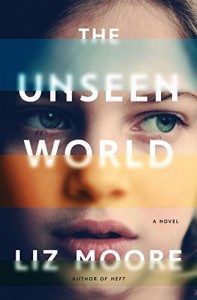
From the Tournament of Books longlist.
Some thoughts on this book are going to entail spoilers (which I'll mark), but I'll first say this was a unique story and point of view: a girl raised and schooled at home by her peculiar, computer scientist father in the '80s is forced from that bubble when he begins exhibiting signs of Alzheimer's. Some elements were a surprise, others predictable but mostly worthwhile anyway, as the father's identity comes into question and Ada, his daughter, seeks answers. The book is written in chunks, some taking place in the recent present, a bit in her father's past, a bit in the future, but mostly in the 1980s when Ada becomes a teenager.
Non-spoilery elements I enjoyed:
I liked Ada, named after Ada Lovelace, considered the first computer programmer, and Liston, her father's lab mate and later Ada's guardian. This novel acknowledges the role women play and have always played in computer science.
I liked how David's choices in raising Ada stem from the personal; in the beginning, before David's history is revealed, these choices could feel like poor ones, not abusive but perhaps selfish. Ada does not associate with peers; she has no friends and knows only adults that her father works with. She observes Liston's boys from afar and only learns of popular culture via Liston and other lab workers. Despite this, Ada still develops the insecurities that go with teenagehood, but on top of that she has insecurities about her insecurities, like she's letting her father down by wanting the things she wants because she should be above them.
My favorite moments in the story are when Ada first begins attending Catholic school after being unofficially homeschooled by David her whole life. Interacting with her father and adults at the lab, Ada is used to being treated as an adult herself, with worthwhile things to say and contribute to their research. On her first day of school, she's immediately assumed to be misbehaving or incapable. This says a lot about how we treat children in the education system, whether public or private. I wish we saw more of Ada at school and her transition to making friends. I also wonder how she did academically and what she thought of the work, given that she's likely operating at above grade level.
Non-spoilery elements I wasn't crazy about:
Liston's sons William and Matty felt somewhat generic as characters, fulfilling roles in Ada's growth, versus Gregory, who is fleshed out (though we don't see how exactly he becomes like his mother). Besides Liston, the other lab folk also feel indistinguishable until the end when a few are more strongly differentiated.
Though the mystery and reveal of David's identity is done well, at times it feels like there are too many pieces of the puzzle (the code, the locked filing cabinet, the computer program, the photos...).
Ada's one of those girls who is attractive, with multiple boys who are interested, but she's unaware of her appeal. It makes sense given her upbringing, but it's a familiar type that's come to drive me nuts. We need more Jane Eyres.
In terms of writing style, my one complaint is that sometimes the author tells you what she just showed you or repeats observations (e.g. David is Ada's whole world). She should trust her readers more.
SPOILERS below:
Returning to an item from above, the revelation of David's queerness and work history in government put his choices in raising Ada in much-needed context. His mistrust of authority, his emphasis on education and thinking for oneself, his near sequestering of Ada, all come to feel less like strictness and eccentricity and more like sane choices.
My biggest gripe is the last chapter and epilogue. The former reminds me of Harry Potter's epilogue where we're given a predictable Happily Ever After of the sort some readers like or require; I would have preferred the story end with the section in 2009. The latter is an unnecessary "twist" that suddenly puts the novel in SF territory; it reminded me of the end of the film A.I. Artificial Intelligence. I can guess the intent--another "child" brought up uniquely, an objective observer to give the story context (e.g. people make mistakes, hurt each other, etc.), but suddenly learning the story's been told by an A.I. is too much of a rug-puller. Still, it wasn't awful enough to sour my enjoyment of the rest.
The Association of Small Bombs, by Karan Mahajan
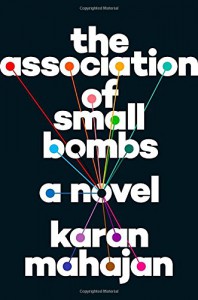
From the Tournament of Books longlist.
I finished this critically acclaimed book while away for the holidays and jotted down a list of likes/dislikes. Short story shorter, I liked it, but what a downer.
The synopsis from amazon:
When brothers Tushar and Nakul Khurana, two Delhi schoolboys, pick up their family’s television set at a repair shop with their friend Mansoor Ahmed one day in 1996, disaster strikes without warning. A bomb—one of the many “small” bombs that go off seemingly unheralded across the world—detonates in the Delhi marketplace, instantly claiming the lives of the Khurana boys, to the devastation of their parents. Mansoor survives, bearing the physical and psychological effects of the bomb. After a brief stint at university in America, Mansoor returns to Delhi, where his life becomes entangled with the mysterious and charismatic Ayub, a fearless young activist whose own allegiances and beliefs are more malleable than Mansoor could imagine. Woven among the story of the Khuranas and the Ahmeds is the gripping tale of Shockie, a Kashmiri bomb maker who has forsaken his own life for the independence of his homeland.
I admired the novel's intricate structure as it shifts across time and multiple points of view. As a writer, I'm always greatly impressed by such a feat when it is accomplished smoothly and clearly. The different points of view also offer insight into how a victim might become a terrorist or sympathetic to one or his cause, how other victims may become advocates, how someone moderate in his faith might become an extremist, how a terrorist may walk away free and be disaffected even as he commits or aids in more acts of terror. In the case of these characters, often it's the personal or psychological rather than the political that provides the impetus for violent action. Refreshingly, this novel does not feel ideological.
The prose is also accomplished, and I liked that the author wrote to his best reader; he did not define or explain cultural or religious terms that may be unfamiliar to a white, atheist Westerner like me. I had no problem looking up information for myself.
Despite what I was drawn to in the novel's craft, I felt the characters were held at a remove, as if I were looking down on them from above. This prevented me from fully connecting with them and the novel as a whole. Without that connection, I finished the story with a feeling of, "Well, that happened." There was nothing to counterbalance the weight of events, not enough beauty to keep the novel from simply depressing me. At times the metaphor of the titular bombs was also heavy-handed.
I can see what critics admire in this work, but I left it feeling untouched.
Black Butler/Kuroshitsuji Vol. 23
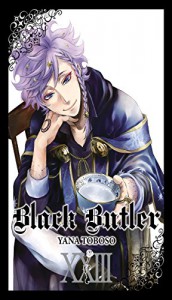
In this volume we see the return of some familiar faces (I won't spoil them all), including the P4 from the Weston College arc, who are, shall we say, stars of a different sort. I'm excited to see Lizzie in a central role for this arc, though she's only scattered throughout this volume. I hope we get some badass Lizzie next time. Also happy for some Emerald Witch this volume, with her hilariously oversexed banter.
There's of course also a new face, Blavat Sky (after the Victorian medium), who's mysterious and interesting, especially due to his interactions with Sebastian (again, being intentionally vague and non-spoilery). He appears to have genuine fortune telling abilities, but I already have a theory about that. In addition, there's what I think is a fresh face at the end who certain fans will surely love (for my part, I already clearly get confused about who's new and who we simply haven't seen in a while).
As a first volume in a new arc, there's a lot of setting up the mystery happening, which is fun in its own way. There's some Sebastian cat action, which is always entertaining, some Ciel in danger, and a bit of the Queen herself. This manga never disappoints, and I'm already anxious for the next chapters.
No Snake or Finny this volume, though, which breaks my fangirl heart...
NPR's Book Concierge
Fun and great for finding books that may have flown under the radar.

 2
2



 2
2










